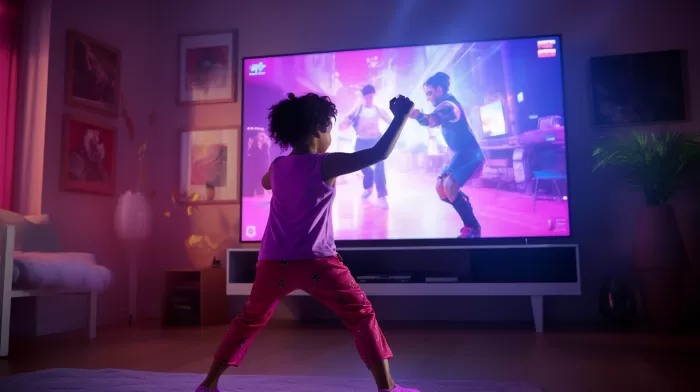Has the constant plea for your kids to turn off the video game console and play outdoors become a familiar chorus? Well, believe it or not, video games have evolved beyond the classic, sedentary image of a child hunched over their controller for hours on end. Yes, you read that right – there are now games on the market that encourage children to be active, breaking stereotypes and potentially getting your kids into better shape.
Interactive Gaming Consoles: The New Generation of Exercise
While traditional video games typically involve sitting in one position for extended periods, interactive gaming systems like the Nintendo Wii and Xbox Kinect have taken things to the next level – promoting movement and turning the living room into a makeshift workout space.
These game systems offer a wide variety of titles, from dancing games like Dance Central to sports games like Kinect Sports Boxing, that require players to utilize their entire body to control the on-screen activities. This not only makes for a fun, engaging experience, but can also contribute positively towards your child’s physical activity levels.
The Science Behind Active Video Games
As a responsible parent, you might be skeptical of these claims. But research has shown that these active video games genuinely impact a child’s physical activity and energy expenditure positively. Kids who take part in these interactive games have displayed significant increases in their heart rates and oxygen uptake.
Of course, it’s essential to understand that active video games alone cannot meet all of the recommended daily physical activity requirements or be the sole solution to combat childhood obesity. Nevertheless, incorporating these games into your child’s routine can be an excellent way to supplement their overall physical activity levels outside of organized sports or outdoor playtime.
Recommendations for Engaging in Active Video Games
To make the most of these active video games, follow these recommendations:
- Choose games that require whole-body movement: Games that rely on extensive physical activity, such as dancing, boxing, or sports simulation, can give your child a more effective workout and keep them engaged.
- Ensure a safe playing environment: Clear the room of potential hazards and ensure there is enough space for your child to move around safely. It is crucial to avoid injuries while they’re having fun.
-
Encourage multiplayer gaming: Playing together not only helps to foster social skills and bonding but can also motivate your child to be more active during gameplay.
-
Balance screen time with other physical activities: It’s essential to strike a balance between active video games, outdoor play, and organized sports to ensure an overall healthy lifestyle for your child.
-
Set a time limit: Just like with traditional video games, it’s crucial to set boundaries for playtime. Set a daily time limit to ensure active video game playing does not consume an excessive amount of your child’s day.
Additional Benefits of Active Video Gaming
Besides the obvious physical health benefits, active video games also offer additional advantages to your child’s development:
- Improved hand-eye coordination: These games challenge a child’s mind and body simultaneously, ultimately helping to improve their motor skills and reaction time.
-
Enhanced cognitive skills: Many active video games feature problem-solving challenges that require strategizing and quick thinking. This can positively impact a child’s decision-making and problem-solving skills.
-
Increased self-esteem and confidence: Mastering new skills and overcoming challenges can give your child a sense of accomplishment and boost their self-confidence, which is crucial for their overall well-being.
To sum up, while active video games shouldn’t replace traditional outdoor play and regular exercise, they can be an entertaining and beneficial addition to your child’s daily routine.
For more insights into incorporating active video games into your child’s life, explore the American Heart Association’s recommendations on the topic, as well as this article from Harvard Health outlining research findings on the impact of active video games on children.



